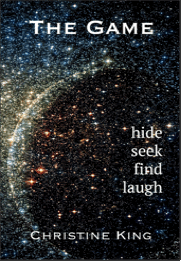
Relinquish control
Question: Tell me more about the rules of the game. Is it really the case that there are no rules, that it's exactly as I think it is: it's as difficult or as easy as I expect, and other common beliefs?
Does belief really dictate the terms and the outcomes of the game? Can I be unaffected by toxic substances or forces if I believe they won't hurt me? What about animals, who are poisoned by things they're completely unaware of and can have no beliefs about. What about babies?
Answer: All of your questions about how things work are more about control, are premised on a desire for control or for greater control. Humans are creators, originators, to the extent that they are thinkers, believers, imaginers, wonder-ers, curious-ers, explore-ers, play-ers.
Relinquishing control really means relinquishing force — trying to make something happen or not happen. It's all about exerting — which is to say, enforcing — one's will on a situation. Trying to have it all your way, never mind about anyone or anything else. It's about stricture, limitation, obstruction, all of which is antithetical to life.
As you cannot see the big picture, the consequences over vast expanses of space and time, you are not choosing well when you operate like this.
Relinquishing control is not removing choice and deliberation from your life. It's not about just floating along and making no choices — of having no choice — at all. It's about dropping the habit of thinking you have to — indeed, that you even can — control every aspect, to orchestrate your creations, the things and experiences you want to have. The thought that if you don't do everything possible to realize your wishes, that if you don't act, then you won't get what you want.
The truth is that it's enough — it really is enough — simply to want it, to focus enthusiastically on it, and to expect it to be created for you — and with you, certainly, although your physical, material role in its production or appearance may not be what you think, from watching all the pushing and shoving, heaving and humping most others do to get what they want.
“Consider the lillies of the field” is good advice and a good example. They neither toil, nor do they spin. The ground is already prepared for them — and for anyone else who wants to grow there and who finds the conditions there conducive to their growth. Rain falls from the sky to water them, and every other thing. The air contains the right amount and type of gas and space (not-gas) they need
to thrive…
All they need do is allow the warmth of the sun and the moisture in the soil to wake them up and encourage them to germinate. The rest happens spontaneously, through processes inherent to their makeup. So, too, you. Everything you need in order to thrive is already present.
Question: So, then why do so many people not thrive? Why have I not been thriving for most of my life? Why is life so hard for so many people?
Answer: Failure to thrive is failure to imagine, failure to trust, to have faith in life and its abundant resources. (As for animals and plants failing to thrive, look to the humans in charge of them.)
Question: Yes, that's certainly true of me. I have not trusted. In fact, I simply accepted without question the jumble of commonly held beliefs about life, both religious and secular, that life is uncertain. I've done plenty of imagining, but without any belief that I can have the sort of life that I imagine about when I daydream. So, yes, it's true that my beliefs have dictated the terms of my experience of life.
Answer: So, too, almost everyone else. It's a very common experience at this time in Earth's history. But not for long. Not for much longer. Many people are waking up, questioning these beliefs, and starting to practice from other beliefs. Some are valid, others are just as flawed. But all are different from the prevailing beliefs — and so there is strife. Resistance. Push-back. Defensiveness. And more attempts to control, at both the individual and societal levels.
Ignore all of it. Go your own way, which, if you're wise, is to relinquish all attempts at control, of yourself and others (animate and inanimate).
Question: This is not the conversation I thought we'd be having about the game.
Answer: Ah, the game. Yes, you want to know how to play it better, play it differently, by your own set of rules, so that you can get more of what you want, when you want it. Don't you see that this is all about control? As if a single human mind can direct the forces of the universe to do your bidding.
Well, you can. That is how creation works. The secret, though, is to relinquish all sense of control. Hold your desires lightly and playfully in your mind; roll them around in your mouth so that you savor their flavour and texture; eagerly plan for them, placing no timeline or other limits
on their appearance. And just thoroughly enjoy your life. That's the secret to success.
Let it come to you. Be ready for it with the beliefs you hold about it (and about everything else). Think of it like Christmas: its arrival is inevitable, and you can celebrate the spirit and joy of Christmas every day of the year.
The opposite of control is freedom. Experience and express freedom in all you desire. That creates the space and the means in/by which it comes about. Freedom.
Relinquishing control really means relinquishing force —
trying to make something happen or not happen.
Everything you need in order to thrive
is already present.

The Game
hide seek find laugh
Christine King
KINDLE eBOOK
USD: $3.50
PAPERBACK
USD: $15.95
EPUB eBOOK (lulu.com) * for e-readers that don't support Kindle files
USD: $3.50
Also available on Apple Books, Barnes & Noble Nook, Kobo Bookstore, and many other online bookstores.